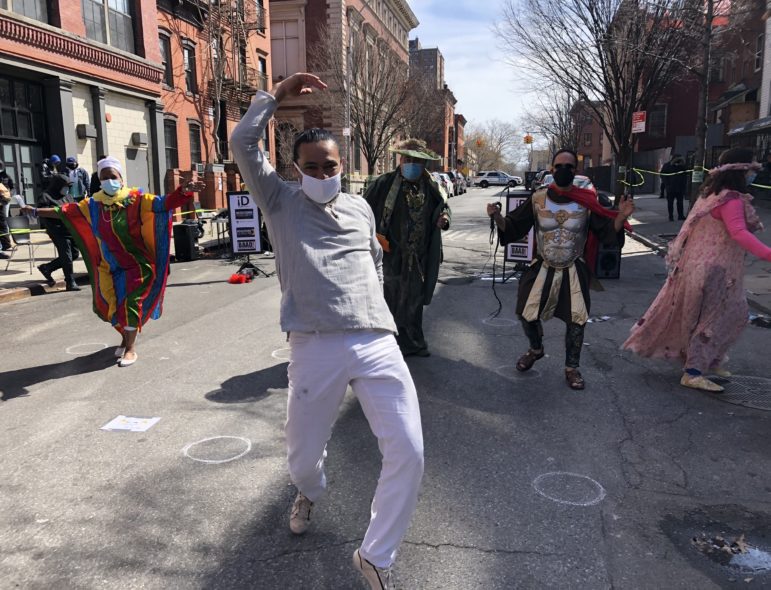The initiative, which kicked off in March, allows cultural organizations to apply for permits to host performances on certain city streets—an effort to help the performance arts sector, hit hard by COVID-19 restrictions, rebound.

Robin Schatell
Daniel Fetecua, a performer with ID Studio Theater, during an Open Culture event in the Bronx.A Queens lawmaker wants the city’s Open Culture program, which has allowed arts organizations to stage performances outdoors on city streets during the pandemic, to be instituted permanently and year-round.
Councilmember Jimmy Van Bramer plans to introduce legislation on Thursday to expand the initiative, which kicked off in March in an effort to help the city’s performance arts sector, hit hard by COVID-19 restrictions, rebound from the pandemic. Since its launch, select city streets have served as the stage for more than 450 outdoor performances and rehearsals, the lawmaker says.
His bill, Int. 2398-2021, would expand the number of streets eligible for Open Culture events to include all of those involved in the city’s Open Streets program, another pandemic-inspired initiative which allows communities to close certain roadways to traffic for use by pedestrians and cyclists. Mayor Bill de Blasio announced in May that the Open Streets program would be permanent.
Both efforts sought to provide more public outdoor space for city residents in light of the extra COVID-19 risks posed by indoor activities. The pandemic has been particularly hard for the city’s artists and art organizations, which endured months of shuttered venues, cancelled performances and slashed budgets.
“By making the Open Culture program a permanent fixture in New York City, we will not only provide an additional lifeline for our artists, performers and vital cultural organizations, it will also create an exciting new norm for diverse performances throughout the city,” Van Bramer said in a statement Thursday.
In addition to making Open Culture permanent, the legislation would mandate that each community district have a minimum number of streets eligible for such performances, and would require the city to produce an annual report analyzing the success and challenges of the program.
It would also expand the eligibility criteria for those who can take part in the initiative, which is currently limited to cultural venues, or to arts organizations that are members of the Department of Cultural Affairs’ (DCLA) Cultural Institutions Group, or those that have received or are eligible for funding from the arts agency. Van Bramer’s bill would allows fiscally-sponsored organizations and City Artists Corp eligible artists to apply for the permits, which require a $20 application fee.
The proposed legislation will be the subject of an oversight hearing by the City Council’s Committee on Cultural Affairs, Libraries and International Intergroup Relations next week.









One thought on “Councilmember Wants to Make ‘Open Culture’ Program, Which Stages Art Shows on NYC Streets, Permanent”
Street art is a modern art form that has pierced absolutely every city in the world! For New York, this is generally an indigenous culture, so no ban should follow.